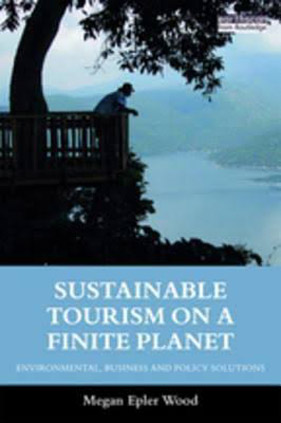Sustainable tourism is not for wimps

Last chance to use tourism to make the world a better and more sustainable place
Over 25 years ago, when I was a ‘Blood on tooth and claw’ mass tour operator, I remember reading about Megan Epler Wood’s creation – the, then new, International Ecotourism Society. Reading that it had thousands of supporters I spouted some bad Trump-like words about people with knitted knickers. But I realized that our industry just had to change.
And then, when the first United Nations Environment Program Earth Summit took place in 1992 – I knew that THIS WAS IT. Everybody had agreed to Agenda 21, ‘Think global act local’, Corporate Social Responsibility, Sustainability accounting – the whole deal. Later Earth summits incorporated sustainable tourism within Agenda 21.
We were even to have COPs (Conferences of the Parties on Climate Change) every year to monitor and manage progress towards a far less suicidal emissions world.
Let’s face it – in the 1990’s the tourism industry was totally overheating. Destinations that came to prominence in the 1960’s and 70’s were being horribly devalued and tourists were leaving them like wastelands.
Half a billion international tourists a year were far too many to provide a sustainable future for everybody. In 30 years growth (by a factor of 2000%) had been too great to manage.
Mass tourism as an easy extractive industry was on the ropes – maybe even finished. It had to change.
So what happened?
There were just 500million international travelers in 1990. Now in the UN Year of Sustainable Tourism for Development we have over a billion – and an industry that seems even more overheated and overbalanced.
Megan Epler Wood’s latest book tells us how it is today with an industry almost so totally out of control it looks as though it is just too big to fail – maybe it will just explode?
An industry which uses our fragile global inheritance as free powerful tourist draws – the Great Barrier Reef, the Taj Mahal, Venice, Ankor Wat, the Inca Trail amongst hundreds of others – where the legal owners, the communities are fearful of exercising care and control and/or demanding payment for their use.
An industry where great hulking cruisers can be moved wherever the owners want to get the best profits without care or reference to the delicate destination communities they despoil with their swamping hordes of alien, unknowing passengers.
An industry where its aviation sector’s "growing carbon footprint hangs like a black cloud over the travel industry’s rosy projections of financial health and environmental respectability" in Megan’s words.
An industry where destinations spend billions on marketing to get ever more visitors and tiny amounts on sustainable product creation and management – even less to engage local communities – their own voters – in the tourism management process.
An industry where power has gone from responsible, visible hoteliers those ‘with skin in the game’ to those gargantuan asset-light bed brands like Marriott to those asset-nil bed marketers such as the OTAs like Airbnb.
In Megan’s book – ‘Sustainable Tourism on a Finite Planet’ – she meticulously, sets out where we are and her suggestions for our future together with dozens of case studies – lessons good and bad.
She lists the situation today in Supply Chains and sustainability; Economic Development in emerging economies; Hotels; Airlines and airports; Tour Operators; the Cruise Industry and Destinations – in effect, our connected world of tourism – our supply chain in itself.
Each single section embodies an existential problem – what rewards are implicit in managing a supply chain sustainably? Why not give poor areas money rather than chancy tourism development? Are hotels still integral to tourism? Are tour operators dying? Will the cruise industry carry on operating with no oversight as to its horrible emissions level? When will destination managers come to realize that their success is ONLY shown by the benefits their destination accrues from tourism and not their the numbers of tourism hordes they bring to degrade their destinations?
Of course Megan, as a leading academic sustainability professional, comes up with very sustainable solutions – in her view destination management needs a complete rethink, international law needs to be adapted to control mega cruise ships, there needs to be more training in tourism, amongst other innovations.
But above all, she says, we need to fall in line behind the latest UNEP initiative – the new Sustainable Development Goals which relate to tourism and achieve a multinational integrated system of sustainable tourism accounting. All this will be supported by the baseline COP 21 – the Paris agreement on climate change, which an incredible 190 nations supported. Megan’s solutions would be financed by the Green Climate Fund, development banks and private finance.
Unfortunately at the time of writing, President Trump is set to take the USA – one of the largest tourism economies – out of both these critical sustainability processes.
But after seeing the problem in 1992 – how did we get to make it at least twice the size by today?
The problem is outlined in Megan’s book, in essence it is this: Tourism inherently is an expensive activity, if you take into consideration parity in wages and working conditions between hosts and guests, the costs of emissions, the real cost of jet fuel, the costs of maintaining a destination and looking after the asset which visitors want to see.
Yet more than in any other fashion-related industry tourism’s growth has been fuelled by ludicrously cheap prices.
So, who pays for these price reductions?
- The world community who haven’t, as yet made the polluters pay (eg there is no tax on airline fuel)
- Workers who are paid minimal wages on bad conditions to service visitors
- Accommodation providers who bid the lowest prices and pay up to 25% to OTAs such as Airbnb
- Local communities who get little in exchange for tourism disturbance
Moreover the massive growth in tourism and development-related tourism has had other victims. If you look at early tourism for economic development (primarily World Bank) projects started in the 1970’s you see many powder-keg destinations – Tunisia, Kenya, Morocco, Egypt, The Gambia amongst them. The hope then was that tourism’s economic and social benefits would foster harmony. But the danger always was that rich package tourists would expose the excesses of the western world to impoverished hosts, foster rage… and become targets themselves.
And why could it change? Isn’t it impossible to wean 1.5 billion people off of the cheap thrills and commodity luxury that they think they deserve?
Yes but only if the destinations have the power to change the paradigm – then maybe… ‘Sustainable Tourism on a Finite Planet’ will add to their understanding and ammunition!
Valere Tjolle
@ValereTjolle
 United Kingdom
United Kingdom United States
United States Asia Pacific
Asia Pacific
























Dozens fall ill in P&O Cruises ship outbreak
BA suspending all Heathrow to Abu Dhabi flights
Turkish Airlines flight in emergency landing after pilot dies
NCL cancels dozens of sailings on three ships
Unexpected wave rocks cruise ship